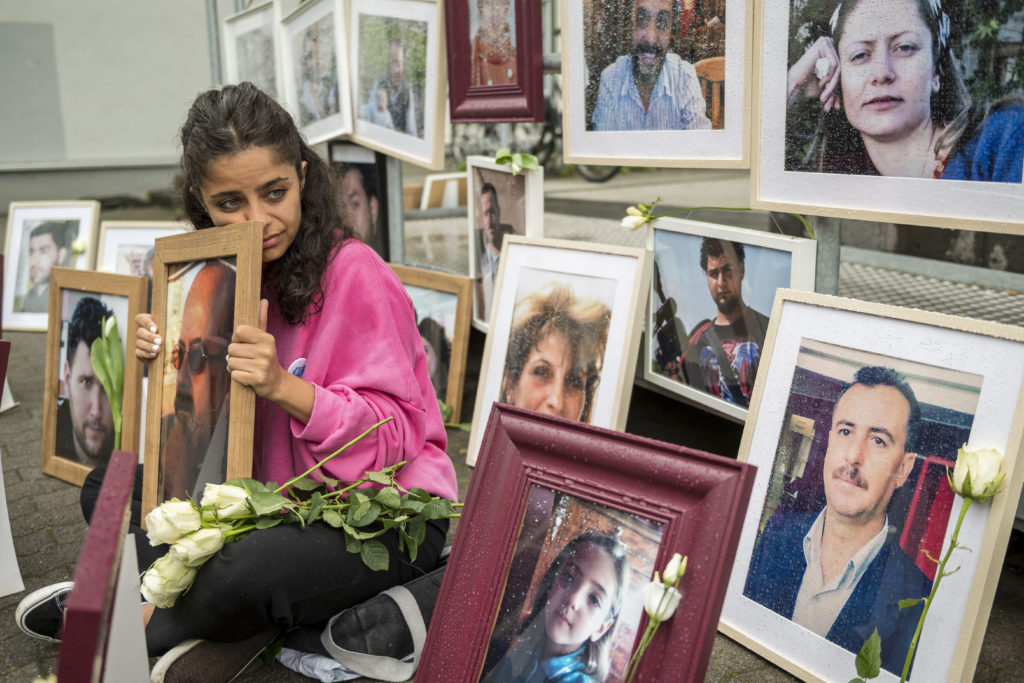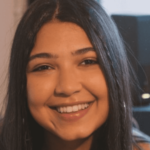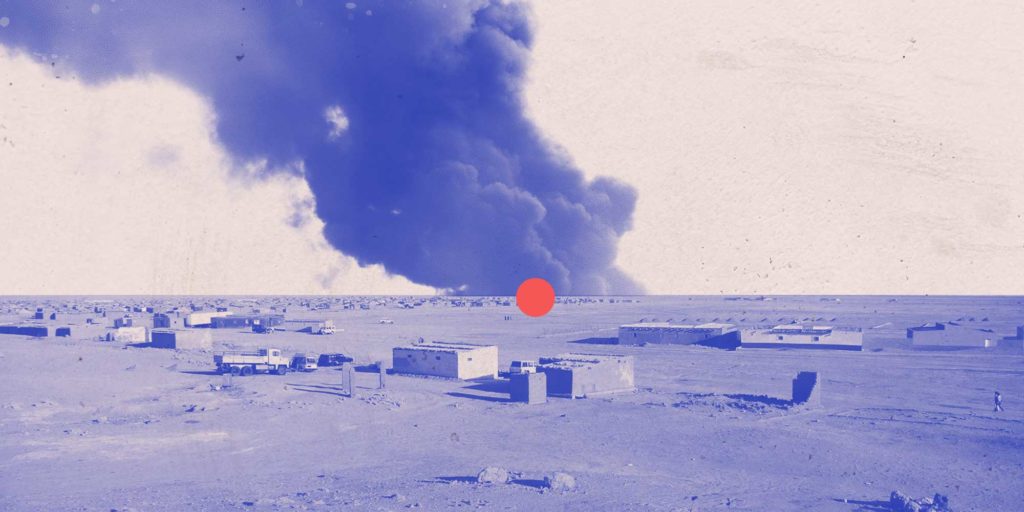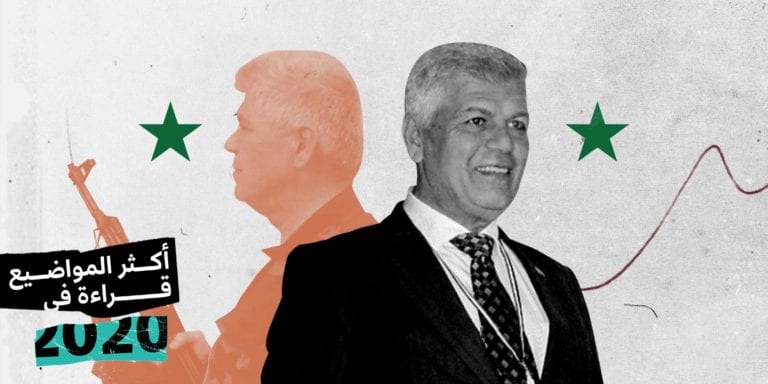Ali Mustafa was forcibly taken from his home in Damascus in July 2013. His neighbors confirmed what his family already presumed: Assad’s security forces kidnapped him, a punishment for his outspoken support of the uprisings and a warning to others. A human rights defender who joined Palestinian fighters in Lebanon during their struggle against the Israeli invasion and stood in solidarity with the beleaguered populations of the Arab world, his sudden disappearance prompted his family to flee Syria for Turkey carrying only their passports.
Eight years on, Ali’s Skype account is filled with messages from his eldest daughter, Wafa. She updates him about current affairs, her personal life, sharing with him the tragedy of Beirut’s Port Explosion—which incidentally fell on her birthday—and the removal of U.S. military forces from Afghanistan. These news bulletins are scattered amongst photos of them and the family together, links to Fairouz songs, and unanswered phone calls. This unreciprocated communication feels good, a tether to her father until he returns.
Wafa now sits in her room in Berlin, her white walls interrupted by a poster of Arabic calligraphy. Her emerald eyes and bright red nail polish flash across the screen, offset by thick, dark hair that hangs in waves ready for the day’s interviews. She sits upright and composed, prepared to recount her experiences to peace organizations and NGOs. Wafa can clearly hold her own in this battle orchestrated by men, her story captivating the attention of international media channels, inexhaustible in her fight for justice.

It starts with the name, she jokes. An eponym of the Palestinian news agency established by the PLO in 1972, her father chose ‘Wafa’ as a nod to liberation. This, she believes, motivated her strength for resistance. Her predilection for rebellion came later, when, as a young girl, she sat on the shoulders of men while shouting slogans that she adopted from her parents’ conversations with guests. Come rain or shine, her Thursdays were spent in a van with other families headed to demonstrations in nearby cities held in solidarity with the Intifada and condemning the invasion of Iraq. The stories and perspectives shared on the road left an indelible mark on her political conscience.
It wasn’t until 2011, however, that Wafa unequivocally identified as Syrian. The early days of the uprisings instilled in her a democratic and national vision previously suppressed by the Assad regime, a sense of belonging tied to the diverse crowds that boldly marched through the streets.
“Great Friday was the first time I went into a mosque. There were no women but me and my friend, pretending to pray to fit in. When the Sheikh ended the prayer, I can’t describe it, but it felt like the mosque became a human being with legs and it started to run. It felt like an earthquake, thousands of people walking out, chanting “Freedom, Freedom!”
Wafa’s hands gesticulate animatedly, as though speaking to a friend, revealing intimate dreams to liberate her father and her country. She still watches YouTube videos uploaded from that day, in awe that she participated in this watershed moment. Her life before the revolution sometimes feels unfamiliar, but she forces herself to remember dates and events, using her memory as a weapon against the regime’s propensity to forget. This eagerness is laced with an admirable steadfastness: when discussing Ali, she exclusively uses the present tense. To forfeit his existence would be a victory for his captors, so she maintains certainty that he’s alive, body and soul.
Recently, drives with her sisters and father through Masyaf’s coastal mountains have replayed in her mind. These otherwise unremarkable trips standout to her because of her father’s choice of The Titanic soundtrack to fill the silence, its romantic aesthetics produced with uilleann pipes and violin hymns capturing the undulation of the sea and softening this “fighter [and] resistor’s” edges. She laughs, lighthearted and carefree, at Celine Dion’s “My Heart Will Go On” dominating the Arab music charts in the noughties, becoming one of the few English language songs that the refined generations of Umm Kulthum and Abdel Halim Hafez enjoyed.
Read Also:
Wafa needs these fleeting memories to replenish her pursuits. Although a vivacious and compelling storyteller, the mist in her eyes reflected by the window across from her computer suggests that pain and exhaustion is still lodged into her body, like a bullet not yet removed. She often furrows her eyebrows and presses her hands across her forehead throughout the conversation, as though trying to make sense of things, still processing that she is part of the 150,000 families who registered the detention or disappearance of their loved ones, and one of the 6 million citizens who have fled, unsure when or if she’ll ever go back.
“Part of knowing [who I am] is painful because I know by now that this is me and this is my life, and it’s going to be my life. It’s hard to accept. Sometimes I walk in the street and wonder how it feels for other women to not lose their countries, to not lose their families, and to not have to fight everyday just to bring their fathers back.”
Unabashed vulnerability is how Wafa rejects idolatry and worship from the public. She has spoken and written about her anxiety and depression at length to show others that she’s not always hopeful, that there are days where she surrenders to futility and numbness—“it’s unfair to me and it’s unfair to them because I’d be lying if I only presented one side to myself.” She still can’t listen to the oud instrumentals of Trio Joubran years after losing her best friend in a shelling because it reminds her of the Spring when her father nursed her while she grieved. Through the crying and screaming, staying up at night and praying, spending her days listening to music and staring at the ceiling, Ali remained patient, asking his daughter for one favor: to visit Beirut with him, where they unknowingly spent his last days of freedom, under the Mediterranean sun, their last photo taken by the city’s rocky shores.
She found refuge in the women that she met during the revolution who shared her fears, her passion, her excitement, and the unspoken apprehension on their way to protests knowing that they might not make it back home. They learned about each other’s struggles and backgrounds as they began to take ownership of their lives.
“When death is present, there is no space for lying or pretending because everything is so real and so raw. The revolution allowed all of us to be open to each other. We didn’t agree on everything, but what brought us together is the belief that we all deserve better than this.”
It’s immediately clear that Wafa holds herself accountable to other women who also face injustice and oppression, never allowing reporters to misconstrue her stories into one that frames her as a damsel in distress in need of salvation from the shackles of Islam and the barbarism of the Middle East. “I’m not going to feed into their desire to talk about me in this way,” she says self-assuredly, shoulders square and chest up, drawing a line that will not be crossed.
Wafa is instinctively grateful for the Syrian families who have campaigned alongside her, condemning the torture, the disappearances and the unlawful detention of individuals throughout the revolution. Though she spoke at the United Nations General Assembly this past year, boldly calling out their “collective inaction and abdication of responsibility,” she will not abandon grassroots activism and mutual aid. Instead, she staunchly believes that word-of-mouth can make powerful incremental progress and “creating a counternarrative to that of the regime” is a pathway to justice. Even when asked if she has any advice or wisdom that she could impart unto the girls and women fleeing Afghanistan for their security and safety, she pauses, surprised at the question, rolling her tongue around the answer carefully.
“I don’t think I’m in a position to advise them. All our experiences are different and we deal with them differently, too. I only wish they didn’t have to go through this, and I hope that I can help and that the world can help, too.”
The humility that underscores Wafa’s commitment to fighting injustice and oppression everywhere glows radiantly in this response. She recognizes every plight as both distinct and intertwined with her own, appreciating that solace comes in varied forms and languages. When she speaks, she does so with her father at the tip of her tongue, whilst also conscious of others’ struggles, wishing that there was more she could do. Some people fight injustice because they can, Wafa endures because she must. This is the only life she can have so long as her father and others are still absent because of their protestations for freedom and for a future that reclaims their dignity and their right to live a life free from oppression and fear. Despite her openness and generosity, there is one question she will not answer: what would she say to her father if he could hear her now? There are parts of herself that she will not disclose: her land and her kin may have been taken away from her, but she still maintains her agency and her privacy, preserving her intimate thoughts and the details of her life from public consumption. This conscious separation provides focus and strength in her unfaltering search for answers about the fate of detained or missing Syrians.
Wafa, who has adopted her father’s name into her own, unreservedly knows who she is, never shying away from her truth and always bringing others along with her. Nevertheless, she pales herself in comparison to her father, slumping her shoulders and rushing her words, revealing that all that she has accomplished so far is an ode to Ali––an unattainable bid to be more like him.
“I will remember him until he comes back. He’ll see then that I didn’t forget about him, and that the whole world knows who he is.”
Read Also:








